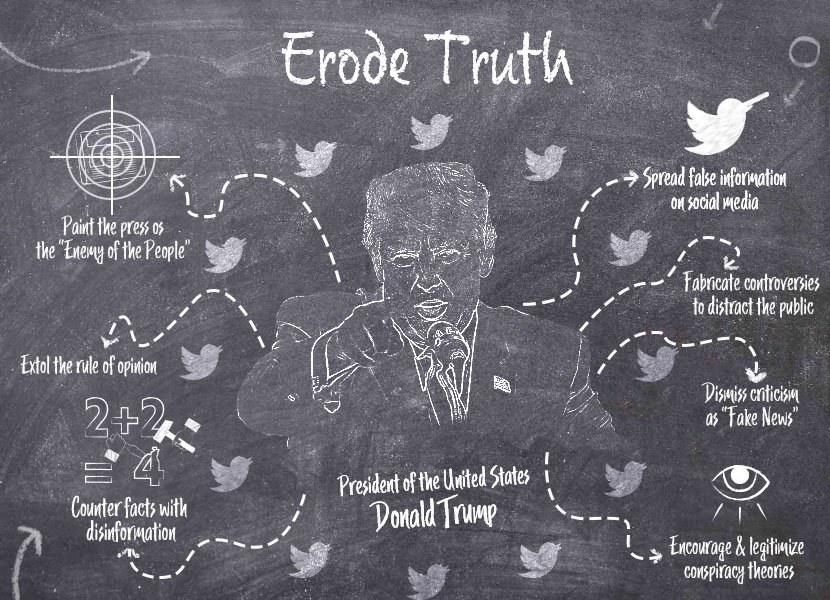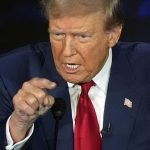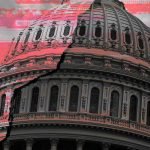
The Erosion of Truth: Understanding Trump’s Fabricated Narratives.
Posted in :
Donald Trump’s administration is synonymous with widespread misinformation, revealing challenges for democratic integrity and the work of fact-checkers to uphold the truth.
The numerous false claims made by Donald Trump during his presidency, analyzing their ramifications on democracy and the crucial role of fact-checking in upholding the truth in political discourse.
Imagine a world where the truth is a luxury, where leaders wield words like weapons. This isn’t a dystopian novel; it’s a reality we’ve faced, especially during Donald Trump’s presidency. With his fabrications and twisted truths, political discourse has transformed into a battlefield of misinformation. This blog explores the depth of Trump’s falsehoods and their implications for our democracy.
The Unprecedented Volume of Misinformation
The presidency of Donald Trump has been marked by an astonishing amount of falsehoods. According to The Washington Post, he made a staggering 30,573 false or misleading statements during his time in office. This figure is not just a number; it represents a significant shift in how political discourse is conducted in the United States.
The Daily Lies
To put this into perspective, Trump averaged about 21 lies per day throughout his presidency. In his first year, he averaged just 6 lies per day. However, by his final year, this number skyrocketed to 39 lies per day. What caused this dramatic increase? Was it a strategy to distract from other issues? Or was it a reflection of a deeper disconnect with reality?
A Systematic Approach
The sheer scale of these falsehoods suggests a systematic approach to misinformation. Analysts argue that Trump’s tactics were not merely incidental. Instead, they were part of a deliberate strategy to overwhelm the public with a “firehose of falsehoods.” This method creates confusion and diminishes the impact of factual reporting. It raises the question: how can the public discern truth in such a chaotic environment?
- 30,573 total false claims
- Averaged 21 lies per day across his presidency
- First year average: 6 lies per day
- Final year average: 39 lies per day
Impact on Public Perception
Trump’s tactics significantly influenced public perception. His claims often undermined trust in democratic institutions. For instance, his assertion that the 2020 presidential election was stolen has had lasting repercussions. Despite numerous court rulings confirming the election’s integrity, he continues to promote this narrative. This behavior raises an important question: what happens to democracy when the truth is consistently undermined?
“In an age of constant misinformation, the truth must be relentlessly pursued.” – PolitiFact
Moreover, during the COVID-19 pandemic, Trump made misleading statements about the virus’s severity and treatment options. His promotion of unproven treatments contributed to public confusion and resistance to health guidelines. This highlights the critical need for accurate information in times of crisis.
In summary, Trump’s presidency has set a new precedent for misinformation in politics. The implications are profound. As society grapples with this reality, the importance of truth in leadership becomes ever more apparent. How can we ensure accountability in the face of such overwhelming falsehoods? The answer lies in a collective commitment to truth and critical thinking.
Key Areas of Deception: Selected Falsehoods
Throughout his presidency, Donald Trump has made numerous claims that have raised eyebrows and sparked controversy. Three key areas stand out: election integrity, COVID-19 misinformation, and immigration exaggerations. Each of these topics reveals a pattern of deception that has significant implications for public trust and policy-making.
Election Integrity
One of the most persistent claims made by Trump is that the 2020 presidential election was stolen. Despite overwhelming evidence to the contrary, he has continued to assert this narrative. Over 60 courts have rejected claims of election fraud, stating clearly that “the allegations of a stolen election have no basis in fact,” according to credible election officials. This ongoing rhetoric undermines public confidence in democratic processes. Why would a leader choose to spread such misinformation? Perhaps to maintain a grip on his base or to distract from other issues.
COVID-19 Misinformation
During the COVID-19 pandemic, Trump made several misleading statements about the virus. He promoted unproven remedies and downplayed the severity of the situation. This misinformation contributed to public confusion and skepticism regarding health guidelines. For instance, his misleading statistics led many to question the validity of expert advice. How can a society effectively combat a pandemic when its leaders are spreading falsehoods? The answer lies in the need for clear, accurate communication from trusted sources.
Immigration Exaggerations
Trump has also exaggerated claims about immigration, often suggesting that criminals are being sent from other countries to the U.S. This narrative has fueled divisive policies and rhetoric, impacting immigrant communities and shaping public perception. Such statements can create an atmosphere of fear and mistrust. Are these exaggerations merely political tactics, or do they reflect deeper societal issues? The implications are profound, affecting not just policy but the very fabric of society.
Lasting Repercussions
These falsehoods have lasting repercussions on societal trust and policy-making. The normalization of misinformation erodes public confidence in institutions. During the pandemic, public health messages were significantly distorted, leading to confusion and resistance to necessary health measures. When leaders disseminate false information without accountability, it sets a dangerous precedent.
The areas of election integrity, COVID-19 responses, and immigration issues highlight how Trump’s fabrications can distort public perception. The challenge remains: how can society navigate through this sea of misinformation? It requires a collective commitment to truth and accountability.
The Mechanism of Misinformation: Strategies and Impact
Misinformation has become a powerful tool in modern politics. It serves as a strategy to maintain narrative control and confuse the public. This tactic is not new; it mirrors propaganda techniques used by authoritarian regimes throughout history. But why is this happening now, and what are the implications?
Understanding Misinformation as a Strategy
At its core, misinformation is about control. When leaders spread falsehoods, they create a fog of confusion. This makes it difficult for the public to discern truth from lies. In this chaotic environment, the narrative can be easily manipulated. For instance, former President Donald Trump’s frequent use of misinformation exemplifies this strategy. By overwhelming the public with a barrage of false claims, he effectively shifted the focus away from factual reporting.
- Confusion as a Tool: Misinformation complicates the traditional media landscape.
- Challenges for Fact-Checkers: The sheer volume of falsehoods makes it hard for fact-checkers to keep up.
Comparison to Authoritarian Regimes
When comparing this approach to authoritarian regimes, the similarities are striking. These regimes often use propaganda to control public perception. They create a narrative that serves their interests, regardless of the truth. In a similar vein, misinformation in democratic societies can erode trust in institutions.
As political analyst noted,
“In an environment where mistrust flourishes, the truth becomes harder to discern and uphold.”
This statement encapsulates the danger of misinformation. It not only misleads the public but also undermines the very foundations of democracy.
The Role of Social Media
Social media has become a primary vehicle for misinformation dissemination. With the click of a button, false claims can reach millions. This rapid spread complicates the landscape for traditional media and fact-checkers. The reliance on social media as a platform for misinformation has increased significantly. As a result, democratic institutions have seen varying levels of trust erosion.
- Increased Reliance: Social media platforms are now breeding grounds for misinformation.
- Trust Erosion: Democratic institutions struggle to maintain public confidence.
Understanding these tactics is vital to combatting misinformation. As society grapples with the implications of falsehoods, it becomes clear that a collective effort is needed. Only through critical thinking and a commitment to truth can the public hope to navigate this complex landscape.
The Role of Fact-Checkers in a Misinformation Age
In today’s world, misinformation spreads like wildfire. The presidency of Donald Trump has highlighted this issue, with a staggering number of false claims made during his time in office. Organizations like PolitiFact and FactCheck.org have stepped up to the plate, dedicating resources to counter these falsehoods. But how effective are they in this uphill battle?
The Challenge of Misinformation
Fact-checking is essential. Yet, it has become increasingly complex. The sheer volume of misinformation can overwhelm even the most dedicated fact-checkers. For instance, during Trump’s presidency, PolitiFact reported robust engagement in their fact-checking efforts. They faced a relentless tide of false claims, making it difficult to keep up.
- Trump made approximately 30,573 false or misleading claims during his four years in office.
- This averages out to about 21 falsehoods per day.
- His claims increased in frequency, reaching an average of 39 per day in his final year.
These numbers are staggering. They raise questions about the effectiveness of fact-checking. Can one organization truly combat such a flood of misinformation? Or is it like trying to empty the ocean with a bucket?
The Importance of Fact-Checking
Despite the challenges, fact-checkers play a pivotal role in restoring credibility. They provide a necessary service in a time when truth seems elusive. As a fact-checking expert once said,
“Fact-checking isn’t just verifying facts; it’s a way to combat lies that undermine democracy.”
This statement underscores the importance of their work. Fact-checkers not only verify claims but also help maintain the integrity of democratic discourse. They strive to inform the public, ensuring that citizens can make decisions based on accurate information.
Public Skepticism and Rapid Spread
However, the battle is not just against falsehoods. Fact-checkers also face public skepticism toward media. Many people question the motives behind fact-checking organizations. This skepticism complicates their mission. When the public is divided, how can fact-checkers effectively communicate the truth?
The rapid spread of misinformation adds another layer of difficulty. Social media platforms amplify false claims, making it easier for them to reach a wide audience. This environment creates a perfect storm for misinformation to thrive.
In conclusion, while organizations like PolitiFact and FactCheck.org work tirelessly to counter falsehoods, they face significant challenges. The volume of misinformation, combined with public skepticism, complicates their efforts. Yet, their role remains crucial in the fight for truth in an age where misinformation reigns.
The Long-Term Ramifications of Falsehoods on Democracy
The impact of misinformation on democracy is profound and troubling. It goes beyond mere falsehoods; it erodes the very foundation of trust in institutions. When leaders spread lies, they create a ripple effect that can destabilize society. This is not just a political issue; it’s a societal one.
Erosion of Trust in Institutions
One of the most significant consequences of misinformation is the erosion of trust in institutions. People begin to question facts and reliable media sources. This skepticism can lead to a dangerous cycle. If citizens do not trust the information they receive, how can they make informed decisions? How can they participate in democracy effectively?
During Donald Trump’s presidency, public trust in major institutions dropped significantly. According to various studies, this decline correlates with the rise of misinformation. As false claims became normalized, skepticism grew. The result? A populace divided and confused.
Impacts on Public Behavior and Policy-Making
Misinformation also impacts public behavior and policy-making. It fosters division and polarization among citizens. When people are fed conflicting narratives, they tend to align with their preferred sources, often leading to extreme viewpoints. This polarization can hinder constructive dialogue and compromise, essential elements of a functioning democracy.
Statistics indicate that division along party lines has increased dramatically. This polarization is not just a political issue; it affects everyday interactions. Friends and families find themselves at odds over basic facts. This division can lead to a breakdown in community cohesion, making it difficult to address pressing societal issues.
The Need for Accountability
Addressing misinformation requires a societal commitment to truth and accountability. It’s not enough for individuals to seek out facts; institutions must also uphold standards of integrity. As a Constitution Scholar aptly stated,
“When leaders fail to uphold truth, they erode the very fabric of democracy itself.”
This statement underscores the importance of accountability in leadership.
Long-term effects of misinformation can undermine the democratic process itself. If citizens cannot trust their leaders or the information they receive, the very essence of democracy is at risk. The normalization of falsehoods is alarming. It compromises future democratic governance and threatens the principles of transparency and accountability.
In summary, the long-term ramifications of falsehoods on democracy are severe. The erosion of trust in institutions and the impacts on public behavior and policy-making create a landscape fraught with division and skepticism. As society grapples with these challenges, a collective commitment to truth and accountability is essential. Only then can democracy thrive in an environment where misinformation no longer holds sway.
TL;DR: Donald Trump’s administration is synonymous with widespread misinformation, revealing challenges for democratic integrity and the work of fact-checkers to uphold the truth.
PoliticalMisinformation, StatisticalMisinformation, PresidentialLies, ImpactOfLiesInPolitics, PoliticalAccountability, DemocracyAndTruth, TrumpFalsehoods, Fact-checking
#StatisticalMisinformation, #PoliticalMisinformation, #TrumpFalsehoods, #PoliticalAccountability, #DemocracyAndTruth, #PresidentialLies, #Fact-checking, #ImpactOfLiesInPolitics,#TrumpLies, #Disinformation, #MediaAccountability, #FactChecking, #DemocracyUnderThreat, #ElectionMisinformation, #COVIDMisinformation, #ImmigrationRhetoric

